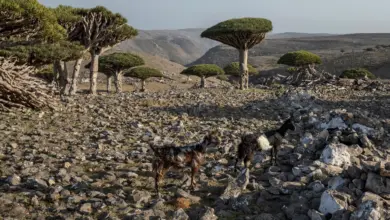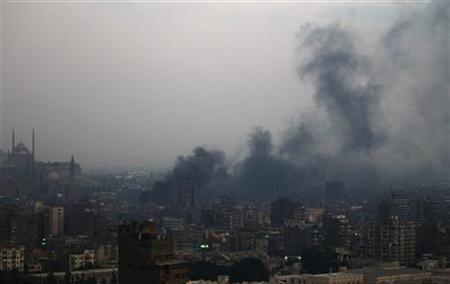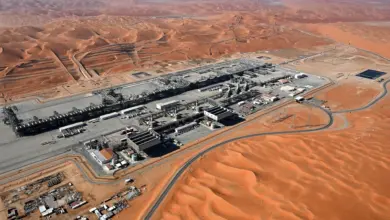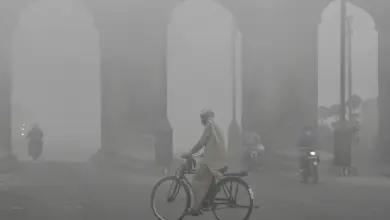“The Great Squeeze: Surviving the Human Project,” a 67-minute documentary about climate change and its consequences on the human species, was screened Saturday at the American University in Cairo (AUC)’s Oriental Hall.
The Wadi Environmental Science Center (WESC), a local NGO devoted to environmental education, organized the showing of the film in partnership with AUC’s American Study Center.
“We decided this year to have a series of screenings preceding World Environment Day on 5 June, instead of organizing a one-day event,” explains Sara el-Sayed, Senior School Coordinator at WESC. “Documentaries always raise a number of questions, instigating people to think about global environmental issues while visually appealing to them.”
Hassan Abu Bakr, professor and researcher at Cairo University’s faculty of agriculture, led the discussions that followed the film and answered questions posed by the febrile crowd.
The documentary attempted to illustrate how human actions and the excessive use of energy for the past 200 years had led to the consumerist behavior that today threatens our very survival. Since the discovery of fossil fuels that led to the Industrial Revolution, we have embraced a vision whereby the world revolves around oil consumption.
Have we reached an oil peak yet? Some experts say so, while others predict it will happen in the years ahead. However, since the 1960s, the discovery of oil sources has been declining regularly, and, as one of the experts interviewed in the film says, “once we pass this oil peak, no country will be able to get enough oil unless another one gets less.”
Excessive consumerism in rich countries eventually became the norm and, according to James Howard Kunstler, an American author who has written extensively about the challenges posed by the coming oil crisis and climate change, “being a consumer is the most degrading role ever given to a human being, as it causes a person to forget their responsibility towards the environment.”
Today, many people worldwide have taken up the American model of consumption-based lifestyles. Of particular concern is the fact that fast-growing economies–such as China and India–are doing this, thus increasing demand for consumer products such as big cars and lavish residences.
The film cites fresh water as the "main issue" of the 21st century, with 1.5 billion people worldwide being denied access to fresh water. For too long, people have taken the availability of water for granted.
For example, the snow on the Tibetan plateau that feeds the Ganges and other major rivers in India and China is rapidly melting, and in 20 to 50 years the Ganges–which currently provides fresh water for some 400 million people–could become a seasonal river. In the US, many states are already experiencing water shortages, while Egypt is already considered a “water-scarce country.”
“We are a water-poor country, but people don’t realize this since the vein of the Nile passes through us,” says el-Sayed. Hassan Abu Bakr points out that “the share of water amongst Nile Basin countries was fixed in 1959, and since then the figures have not been revised. In the meantime, the population has doubled many times, increasing from 18 million inhabitants to 80 million, while each country’s share of water remains the same.”
The chapter of the documentary entitled “The Final Straw” focuses on the many aspects of climate change–from floods to droughts and heat waves–with one expert declaring that “we failed to stop climate change and we did not foresee the speed of the changes that are occurring.”
In the year 2007, 30 percent of the ice cap is said to have melted while Antarctica and Greenland witnessed the expansion of warm areas, which could lead to a six-meter sea level rise (SLR). This SLR will force the roughly 30 percent of the world’s population that currently live in coastal areas to be relocated inland or to another country altogether, thus raising major political, economic and social challenges.
Experts interviewed for the documentary highlight the crucial need for a swift transition from fevered consumerist behavior to a society driven by simpler economic goals. One of these experts went as far as saying that “we have to aim for a simpler society with less economic growth and ultimately no economic growth at all.”
Half of the world’s population today is under 25 years old, and, as Hassan Abu Bakr puts it, “the radical decisions that will condition your future have to be taken by you, the youth. You will have to let go of a lot of things,” he declared.
El Sayed thinks that what needs to be changed in Egypt is “the perception people have of environmental issues. They picture tree-huggers and dying polar bears and other things of the sort that are disconnected from their lives.” Gravely, she adds that “environmental issues in Egypt are in fact completely connected with people’s everyday lives as they touch upon our basic needs for food, water and a healthy environment.”
Another documentary entitled “Death of the Nile” by journalist Nadia el-Awady, which focuses on the potential fate of the Nile Delta, will be screened in April as part of the same film series.




